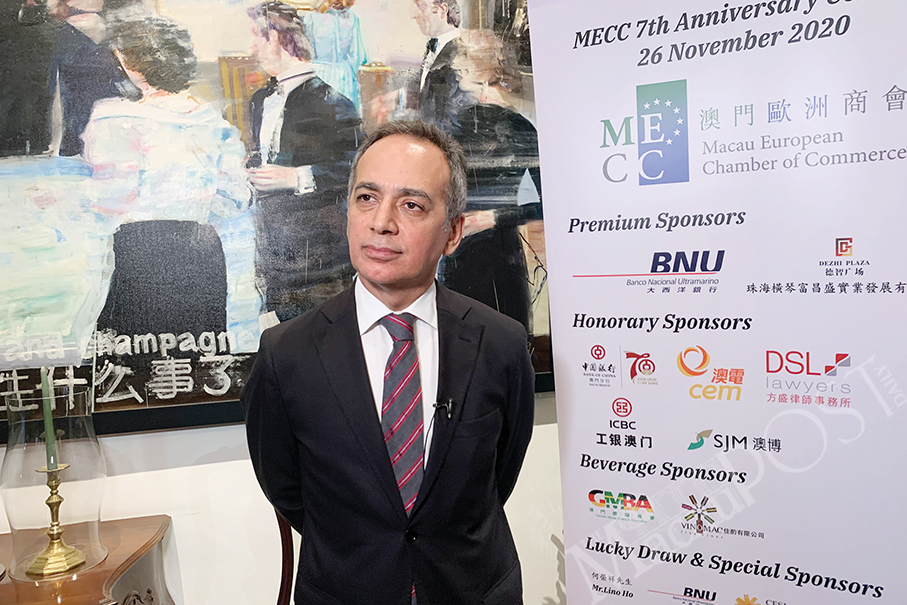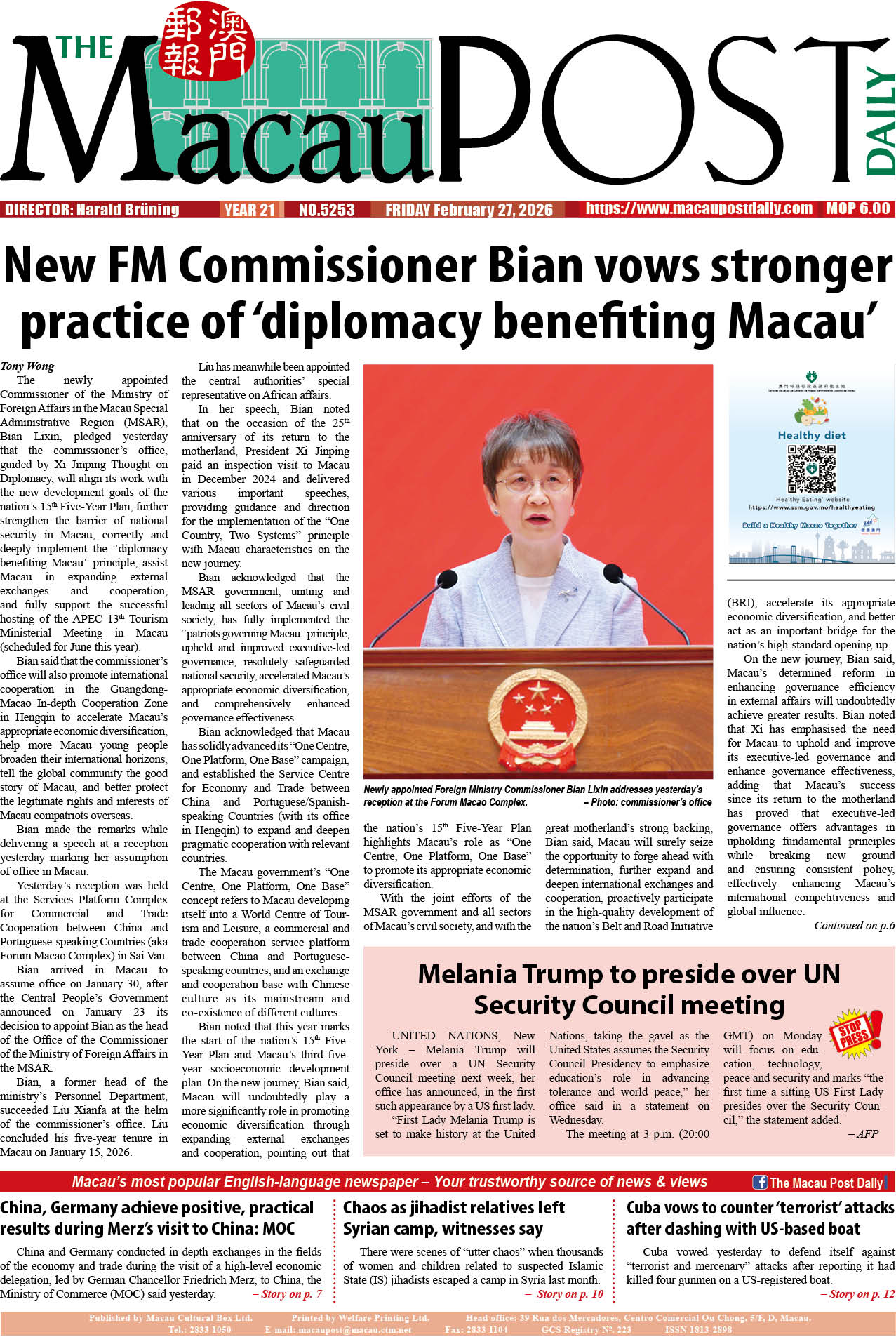After attending Friday’s conference marking the 70th anniversary of the Five Principles of Peaceful Coexistence and one of its four sub-forums in Beijing on Friday, I am convinced all the more that they are needed more than ever.
While participating in an exchange session with the nine panellists of the second sub-forum’s Topic 1 on “Upholding independence and jointly building a just and equitable international governance system”, headed by China Public Diplomacy Association President Wu Hailong, I had the opportunity of sharing some of my personal views with the panel and the audience about the Five Principles.
I pointed out that the Five Principles have accompanied me all my life, considering that they are the result of a Chinese initiative together with India and Myanmar (then still known as Burma) in 1954, one year after my birth in Germany.
However, I only became aware of the Five Principles during a junior high school civics class when I was about 15 years old, and what I do remember is that I was quite astonished that three so-called “Third World” countries – that’s how the developing world was then pejoratively called by the West even though even then it accounted for the majority of humanity – were able to develop such an internationally important concept without any involvement of the West, which then was still overwhelmingly powerful in international relations, and at a time when scores of countries were still subjected to colonial rule or had regained their independence only recently, often after painful liberation struggles.
Only as a university student in the 1970s was I finally able to deepen my understanding of the Five Principles, which I still regard as one of the most important and fundamental principles of global governance ever created – as they are much broader than the 17th century Westphalian system limited to state sovereignty.
For the record, I am listing the Five Principles of Peaceful Coexistence: 1) mutual respect for each other’s territorial integrity and sovereignty; 2) mutual non-aggression; 3) mutual non-interference in each other’s internal affairs; 4) equality and cooperation for mutual benefit; and 5) peaceful co-existence.
Bandung, UNGA, Shanghai Communiqué
In 1955, the 29 nations attending – including China – the historic Bandung Conference in Indonesia incorporated the spirit of the Five Principles in their 10-point “Declaration on Promotion of World Peace and Cooperation”. Ever since, the Five Principles have been enshrined in the Constitution of the People’s Republic of China (PRC), formally recognised by the United Nations General Assembly (UNGA) and even made it into the China-US Shanghai Communiqué of 1972.
The Five Principles are more topical than ever, considering the tumultuous predicament the world is going through right now. They are also the Asian value system’s important contribution to the ongoing construction of a global community with a shared future for mankind, as outlined in detail by President Xi Jinping on the global stage.
For the Global South in particular, the Five Principles continue to be the conceptional foundation for building a fairer and more equitable international governance system. They have become, I believe, not only the guidelines for international relations among the about 130 Global South countries and territories, which account for about two-thirds of the world’s total number, but, I hope, will be cherished by all nations as a matter of course before long.
Five Principles, three global initiatives
Moreover, the Five Principles should nowadays also be seen within the context of China’s three global initiatives launched by President Xi with the aim of promoting human progress: 1) the Global Development Initiative (GDI); 2) the Global Security Initiative (GSI); and 3) the Global Civilisation Initiative.
I regard China’s three global initiatives as a direct follow-up development of the Five Principles, such as by aiming for inclusiveness and benefits, win-win results instead of zero-sum games and respect for the diversity of civilisations, which includes respect for different value systems.
All these aims are, within the ambit of the Five Principles, the Global South’s response to some Western countries’ attempt to impose their supposedly “universally valid” socio-political values on nations that have, for centuries or even millennia, developed their own value systems, which, I think, should always be interpreted in relation to their respective national, regional, social, cultural and religious context, such as, for instance, the West’s emphasis on individualism versus, generally speaking, the Global South’s stress on the collective whole. That’s why there are, obviously, Asian values, Western values, African values, etc.
On the global security front, one of the most important requirements is, in my view, that the legitimate security interests of any country always need to be taken into account by the international community. We all know what happens if this vital requirement is wilfully or carelessly ignored…, then peaceful coexistence is at stake.
BRI & BRICS
I also believe that the China-initiated Belt and Road Initiative (BRI) and establishment of the BRICS group of nations are both direct consequences of the Five Principles’ concept of tackling global issues.
I wrapped up my brief remarks in Beijing on Friday by underlining that the Five Principles “have no expiry date” – they are here to continue the ongoing development efforts by the Global South, the home of around three-quarters of our battered planet’s population.
One can only hope that the G7 club of the world’s – supposedly – seven “richest” nations will finally come around and respect the politico-economic interests of the Global South nations. As a matter of fact, in terms of Purchasing Power Parity (PPP), the world’s top seven “”richest” countries currently consist of the Global South’s China (No. 1), India (No.3) and Indonesia (No.7), as well as the Global North’s United States, Japan, Germany and Russia ranking second, fourth, fifth and seventh respectively.* Therefore, I believe, the G20 is nowadays a much more globally meaningful economic group of nations than the G7, considering that half of its 20 members are Global South countries.
The panels’ four sub-forums which were held on Friday afternoon at the Diaoyutai State Guesthouse included former presidents and prime ministers as well as scholars and experts from the Global South, which is not a geographic but a socio-economic concept, considering that Western countries such as Australia and New Zealand are regarded as parts of the Global North.
On Friday morning, I attended the central government’s Conference Marking the 70th Anniversary of the Five Principles of Peaceful Coexistence, moderated by Premier Li Qiang, which included a keynote address by President Xi, who started his 40-minute speech by declaring that the purpose of the event, which was attended by around 600 people, was to “carry forward these principles under the new circumstances, building together a community with a shared future for mankind, and providing a strong driving force for human progress.” **
Xi stressed that “the vision of building a Community with a Shared Future for Mankind carries forward the same spirit of the Five Principles of Peaceful Coexistence.” He emphasised that both concepts are “rooted in traditional Chinese values”.
Xi lists 6 ‘need-to do’ points
Regarding the future development of the Five Principles, Xi listed six “need-to-do” points: 1) We need to uphold the principle of sovereign equality; 2) We need to cement the foundation of mutual respect; 3) We need to turn the vision for peace and security in reality; 4) We need to unite all forces to achieve prosperity; 5) We need to commit to fairness and justice; 6) We need to embrace an open and inclusive mindset.
Xi also announced an openhanded raft of initiatives to better support Global South cooperation, such as that China will establish a Global South research centre, provide 1,000 scholarships under the Five Principles of Peaceful Coexistence Scholarship of Excellence and 100,000 training opportunities to Global South countries in the coming five years. He also said that between now and 2030, China imports from fellow developing countries are expected to exceed US$8 trillion.
I asked about a dozen members of the audience from the Global South about Xi’s speech. The most common assessments were “a powerful speech” and “very meaningful”. I think both are spot on.
Xi’s audience included former Brazilian president and current president of the BRICS New Development Bank Dilma Rousseff and former French prime minister Dominique de Villepin. Both were among various visiting dignitaries who delivered speeches at a luncheon hosted by Foreign Minister-cum-State Councillor Wang Yi at the Diaoyutai State Guesthouse after Xi’s address.
Wang stressed in his speech that “the implementation of the Five Principles of Peaceful Coexistence is an ongoing process with no endpoint, and the building of a Community with a Shared Future for Humanity is under way.”
I would like to use this opportunity to thank the efficient and friendly officials from the Foreign Ministry in Beijing, and also the generous assistance offered by the ministry’s Commissioner’s Office in Macau, for all their help, advice and support that made my participation in Friday’s conference and sub-forum an unforgettable experience. I met many old friends and made many new ones during the one-day event. And, last but not least, I learnt a lot.
There was only one disappointment: The Beijing Foreign Languages Bookstore on Wangfujing Street – my “must-go-to” when visiting the nation’s capital – is under renovation and slated to reopen only at the end of next year.
*https://www.globalfirepower.com/purchasing-power-parity.php#google_vignette
**The full text of Xi’s speech is available on our website https://www.macaupostdaily.com/article21934.html
– Harald Brüning








